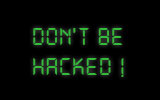Don’t be hacked!
DON’T BE HACKED! Today, this is an all too familiar refrain. While hacking is an unfortunate byproduct of online use, you do not have to wait to be a victim to do something about it. You can and should create strong passwords, and change them regularly.
According to Nick Berry, founder of Data Genetics, a Seattle technology consultancy, nearly 11% of the 3.4 million four-digit passwords he analyzed are 1234 with the second most popular being 1111 (6% of passwords), followed by 0000 (2%).

Given the amount of data we store and access online, we need to be much more vigilant in protecting our accounts.
There are many, many ways to create safer and more secure passwords, and we encourage you to check them out – just search for password security on your internet browser. In the meantime, below are a few simple steps you can follow to help protect yourself from those who will try to hack into your account.
Do:
- change your password often – experts recommend every 3 months
- create a password that is at least 8 characters long
- include numbers and character symbols such as “%”, “$”, and “*”
- use multiple words and numbers, and even intentionally misspell a word
Don’t:
- use your name or children’s names and/or birthdates
- use words that represent your hobby or interest
- use easy to guess passwords such as 1234abcd
- use the same password for all of your online accounts
None of us want to believe that hackers exist, but they do. And none of us want to believe it could happen to us, but it can. Hackers use some very sophisticated methods to get at your online accounts – as is demonstrated by the banks and large companies who have recently been victims of hackers. Don’t think that just because you are a small business, or have a small bank account that they are not interested in you; they are. So, change your password now and change it often. Set up a calendar reminder if necessary. Be proactive and know that you are doing all you are able to keep from becoming a victim of these online predators; you can.
Back to Fall 2012 Newsletter »
